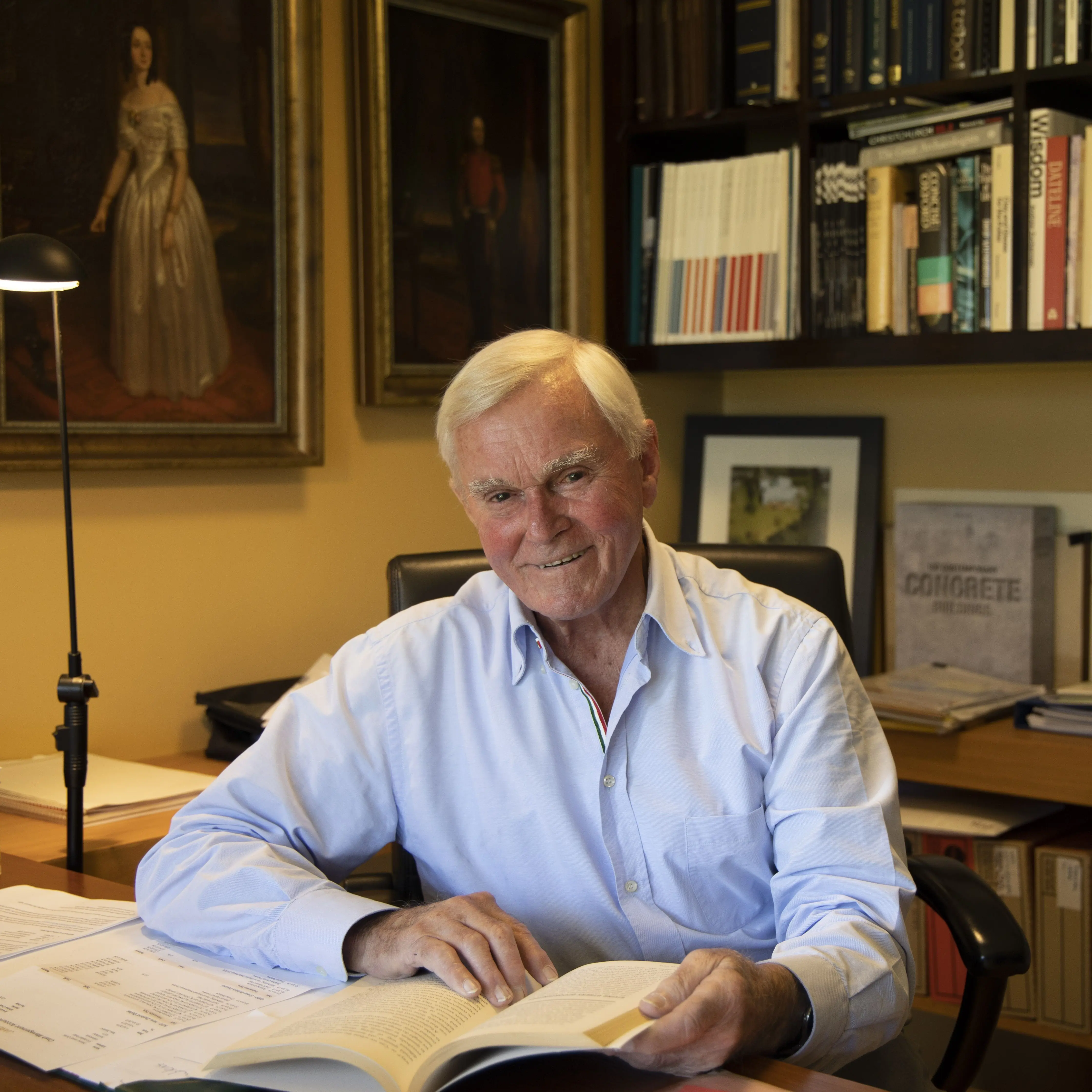Sir Ron Carter ONZ KNZM
Civic-minded engineer, international businessman and community man.
The 2019 BLAKE Medallist is a humble, pragmatic, passionate New Zealander with a huge capacity for contribution.
Sir Ron Carter blended a career at the helm of the international consultancy firm he co-founded with decades of significant civil service. Successive Governments turned to him time and again, asking that he utilise his pragmatic engineer’s mind to help his community.
Businessman Sir Christopher Mace, chair of the BLAKE award selection panel, says Sir Ron is “a national treasure”.
“When Ron gets the bit between his teeth and he’s on a mission with a project, he’s unstoppable. You get a constant stream of progress.
“Ron can make things simple. He likes to get on and do things in a sensible pragmatic way. He just genuinely pops up everywhere, offering support and helping young people, in particular.”
Sir Ron says he and his sisters grew up in Auckland with “marvellous parents”, and have enjoyed “good, standard New Zealand lives.”
Their English-born father was an aircraft mechanic, at age 17, in the First World War. He battled poor health during and after the Second World War, and died when Sir Ron was a teenager – at which point their New Zealand-born mother entered the workforce to provide for the family.
Sir Ron says his parents instilled in him good values.
“You were expected to do your part.”
That sense of service has stayed with him his whole life. Still today, aged 84, he is part of an advisory panel at his former school, Auckland Grammar. Sir Ron believes every New Zealand child, regardless of background, should have access to an excellent quality of education. He credits the school with giving him that, although he has noted in the past that he did not attract much attention while there.
“In all my days at school, although I was in a high-achieving class, I did not cross the platform once in my five years at Auckland Grammar to receive a class or a subject prize.”
Sir Ron did an engineering degree and post-graduate study at Auckland University. He was a keen sailor and met his future wife Lewell, Lady Carter, at a dance at the Mansion House on Kawau Island.
Lady Carter studied art at Elam, became a teacher, and later coached swimming right up to Commonwealth Games level. The couple have three children – one of whom, David, is the chair of Beca – and nine grandchildren.
Sir Ron, now 84, says he made two great decisions in his life. The first, 60 years ago, was to marry Lady Carter; the second was to study engineering.
“I have been lucky to have such a rewarding career.”
Sir Ron was one of the founders of the firm Beca, Carter, Hollings and Ferner, which eventually became Beca Group Ltd.
The company has more than 3400 staff around the world, and is behind key projects such as Auckland’s Sky Tower and Waterview Connection.
Sir Ron joined Beca in 1959, became a partner in 1965, aged just 30, and was both CEO and chair from 1986. While at the helm, he drove the company’s expansion on projects extending from East Africa to the Pacific and Central America. He set up branch offices in four south East Asian Countries.
But he ranks the formation of joint ventures with some of the world’s leading firms to carry out large industrial and civil engineering projects in NZ as his most important contribution to the success of his firm.
He stepped down from the CEO’s role in 1996 and retired from the chairmanship, after 15 years, in 2001.
Sir Ron says his choice to become an engineer meant he spent his career surrounded by smart, logical people whose work necessitated collaboration.
“I’ve been lucky as an engineer. There are very few engineering projects that are carried out by an individual. You work with a wide range of expertise to make a project happen. A lot of the voluntary positions that came my way made good use of those collaborative skills I learnt at work.”
On the cusp of 80, Sir Ron served on the Royal Commission of Inquiry in to the Christchurch earthquakes – a two-year commitment which, due to the requirement for him to understand the full scale of the human tragedy, took a heavy emotional toll. He says it was the hardest job he ever did.
“I knew what a big job that was going to be. I felt, that although it was going to take over my life for the period of the work, how could I refuse when so many other people had their lives completely disturbed, and some destroyed, by the earthquakes?”
In more than 30 years of service to New Zealand, Sir Ron also chaired the Committee for Auckland, sat on the board of the 2011 Rugby World Cup and was appointed to the New Zealand Infrastructure Advisory Board.
He was a director of Rural Equities, Air New Zealand, Trustpower and Aetna, and president of the New Zealand Institute of Professional Engineers. He sat on the council of the Royal Society, which tasked him with analysing successful New Zealand companies to determine why some businesses soar while others flounder. His conclusion was that the secret to a company’s success was its leadership.
He was founding chair of the Civil Aviation Authority and a director of the Electricity Corporation of New Zealand. He established the Iwi Business Consortium and, as Chairman of the Committee for Auckland, he pioneered the concept of a policy to employ Maori graduates.
He chaired the Government’s review team on the management of New Zealand’s borders, and was part of a 3-person committee tasked with studying Auckland’s 1992 water shortages and making recommendations to Government.
He also held governance roles with the Sir Peter Blake Trust until 2011 – and was involved with its establishment in 2004. The Blake medal is the supreme annual leadership award and recognises Sir Ron’s decades of service to New Zealand.
When glancing back over his community roles, Sir Ron says: “It’s been a load of fun, and very enjoyable and rewarding as well.”
Sir Ron’s extraordinary contribution was celebrated in 2014 when he joined the ranks of the Order of New Zealand. There are only ever 20 living members in the Order at any given time.
“Mine has been an interesting life,” he says.


